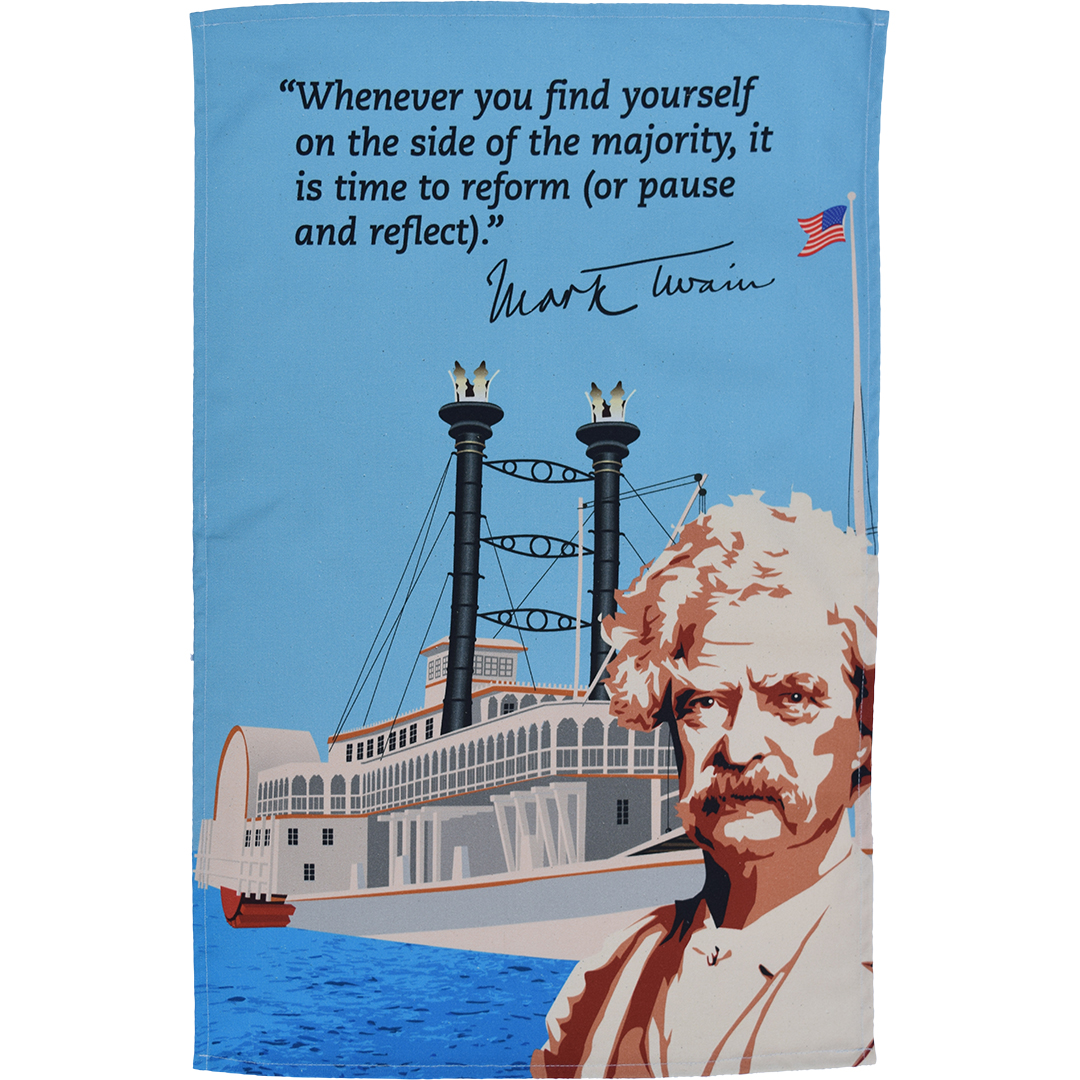And So I Am an Anti-Imperialist: How Mark Twain Became a Radical
Posted by Pete on Aug 19th 2022
The story of Mark Twain, American author and radical convert...
British Prime Minister Harold Wilson once said of his colleague Tony Benn that he “immatures with age”.
Obviously we don’t believe that there was anything immature about Tony Benn’s radical politics.
But it’s fair to say that the older Benn got, the more left-wing he became. The same goes for Mark Twain.
Our new Mark Twain tea towel, featuring a quotation from his Notebooks
Click to view our Mark Twain tea towel
Born in Missouri in 1835, Samuel Langhorne Clemens (he wouldn’t become ‘Mark Twain’ until he chose that pen name in 1863) was hardly a lefty.
Albeit a trade union supporter from an early age, he held derogatory views about Native Americans and even briefly joined the Confederate Army when the Civil War broke out in 1861.
But as Twain’s writing career began to take off in the mid-1860s, he also became engaged in radical politics.
After his dalliance with his native Confederate South, Twain became an admirer of Abraham Lincoln and a passionate abolitionist.
Abraham Lincoln issued the Emancipation Proclamation and ensured the passage of the Thirteenth Amendment, outlawing slavery in 1865
Click to view our Abraham Lincoln tea towel
On the Emancipation Proclamation, Twain wrote that it “not only set the black slaves free, but set the white man free also.” And he published the memoirs of Union war hero and abolitionist President, Ulysses S. Grant.
As time passed, Twain became a rare voice of protest against the brutal racism inflicted on Chinese immigrants in the late nineteenth century, and dropped his own prejudice against Native Americans, criticizing their depiction by other writers as passive and thoughtless.
Twain also became an outspoken ally of the U.S. labour movement. He had been a union man himself while working riverboats on the Mississippi. In a speech to the Knights of Labor he asked:
“Who are the oppressors? The few: the King, the capitalist, and a handful of other overseers and superintendents. Who are the oppressed? The many: the nations of the earth; the valuable personages; the workers; they that make the bread that the soft-handed and idle eat.”
Mark Twain was quite self-conscious of this leftward shift in his politics.
He wrote that every time he reread Thomas Carlyle’s history of the French Revolution, he identified with a more left-wing faction, until he ended up supporting the most radical sans-culottes.
But Twain’s biggest left turn was over imperialism.
Twain befriended many of the giants of the abolitionist movement, including Frederick Douglass and Harriet Beecher Stowe
Click to view our Frederick Douglass tea towel
After the U.S. Civil War, when the radical promise of Reconstruction had been killed off, the northern and southern ruling elites reunited behind a project of imperial conquest.
Over the late nineteenth century, U.S. forces gallivanted around the Pacific, conquering islands as large as Hawaii and adding to the huge chunk of land conquered from Mexico in 1848.
But this round of imperialism really came to a head in the Spanish-American War of 1898.
Under the false pretext of liberating Puerto Rico, the Philippines, and Cuba from the Spanish empire, the U.S. government colonised them all for itself.
It was in the context of this deceitful war that Mark Twain did a U-turn on his previous support of U.S. empire.
In earlier years he had backed the colonial project in Hawaii, and had initially believed the official line that the 1898 war was to liberate, not colonise.
But as U.S. forces began to turn on Cuban freedom fighters and subjugate the Philippines, Twain turned completely against ‘Manifest Destiny’ and American empire.
“We have gone there to conquer, not to redeem. It should, it seems to me, be our pleasure and duty to make those people free, and let them deal with their own domestic questions in their own way. And so I am an anti-imperialist. I am opposed to having the American eagle put its talons on any other land.”
Mark Twain’s political trajectory, from Confederate militiaman to left-wing anti-imperialist, shows that people can always change for the better.
And maybe the world can change with them, too.



